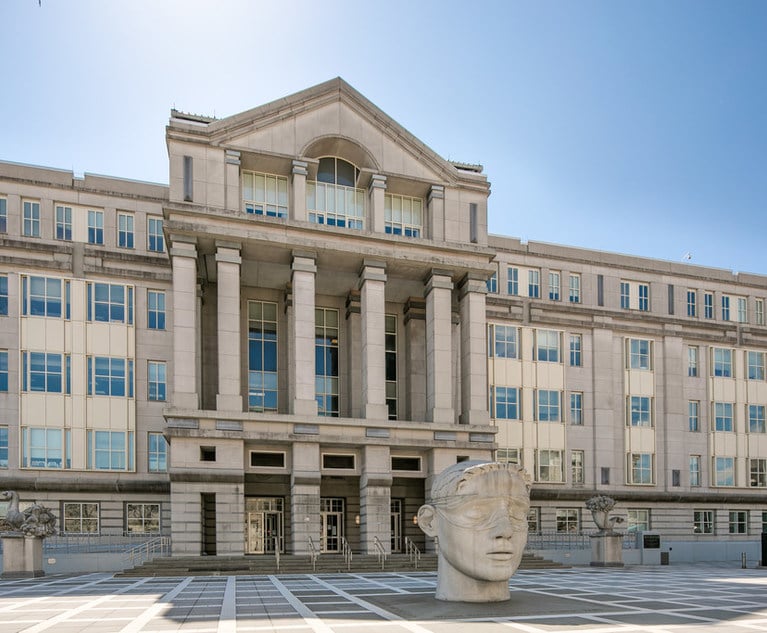According to dockets, Kirkland & Ellis was involved in 10 bankruptcies in New Jersey over the past two years, which is exactly the same number of bankruptcies the Am Law behemoth was involved in in the Garden State over the preceding 30 years from 1992 to 2022.
Clearly, someone has taken note that New Jersey is an ascendant venue for Chapter 11.
“It’s gaining a reputation,” said Northwestern University law professor Bruce Markell, who focuses on bankruptcy and previously served as a bankruptcy judge. “Where Kirkland goes, a lot of people will follow.”
Exactly why the Garden State’s bankruptcy court is increasingly being looked to for large bankruptcies is a multifactored question, but many point to the work of Chief Judge Michael Kaplan in helping the bench gain and spread a reputation for one that moves efficiently and effectively.
Predictability on core litigation issues, as well as more administrative things such as fee petitions or disqualification efforts, can also play a role in venue considerations, according to litigators, leading some venues, such as the Southern District of Texas and the Eastern District of Virginia, to recently fall out of favor, while others rise.
But regardless of the exact combination, firm leaders and bankruptcy lawyers in the Garden States are bullish on the bankruptcy court’s emerging reputation, saying they are currently experiencing a boom in work that they hope will continue now that market leaders, such as Kirkland, are reliably filing there.
“It’s welcomed news for practitioners, who are focused or have a presence in New Jersey, when a very large and complex case like a Rite Aid is filed here,” said Warren Usatine, managing partner of Cole Schotz, a Hackensack-based firm that has a focus on bankruptcy. “There’s plenty of opportunity for New Jersey-based people to co-counsel with folks from out of town.”
A spokesperson for Kirkland declined to comment for this article.
Factors to Consider
Bankruptcies must be filed in venues where a company resides, is domiciled, or has its principal assets. While that limits where companies can file their bankruptcies, oftentimes companies still face a range of choices, and in those instances, considerations such as the depths of knowledge on the bench and its speed in handling motions can come into play.
And, according to some observers, so can the likelihood a court will disqualify their counsel, or reject fee petitions.
“What it takes to become a favored destination is quite controversial,” Markell said. “The cynics would say it’s judges who will rule in debtors’ favor, grant all their fee requests and make life a little easier for them.”
Rulings on issues such as fees and disqualifications are also closely watched.
For example, in May, an Eastern District of Virginia bankruptcy judge denied the company Enviva’s application to retain Vinson & Elkins over connections the firm had with the debtor. Specifically, Enviva was 43% owned by Riverstone Investment Group LLC, a private equity firm that Vinson & Elkins had billed for $14 million in 2023.
After the judge denied the bid to bring on Vinson & Elkins, Big Law bankruptcy attorneys told Law.com that they would now be steering away from the venue, with one saying, “They’re burned.”
Only a few weeks before that ruling, the trustee in In re Invitae Corp. had also sought to disqualify Kirkland from representing the debtor in the New Jersey bankruptcy because the firm had previously represented the company’s largest noteholder. Although none of those matters was related to the bankruptcy, the trustee argued that the transaction between Invitae and the noteholder was central to the bankruptcy proceedings. But finding that there was no conflict of interest, the disqualification effort was rejected.
Observers said those cases posed very different questions to the courts regarding disqualification, but that disqualification rulings are closely watched.
For his part, Kaplan, speaking generally, said he felt the attention paid to these issues in social media and academic circles was “unwarranted.” Many judges, he said, use independent fee examiners to weigh in on requests and that in many instances firms work at a reduced fee. As for disqualifications, he said he has seen two in 18 years that had to be litigated to the point of a written opinion.
“These are almost always very fact-specific and hardly outweigh other important issues and considerations such as sale/bidding procedures, approval of break-up fees, use of cash collateral, third-party releases, appointment of examiners, availability of combined disclosure and confirmation hearings, again just to identify a few,” he said.
Although litigators said judges in venues without much Big Law seem more likely to balk at the ever-rising rates at top-tier firms, litigators largely agreed that the specific motions being decided—whether on fees or on the merits—matter less than consistency. According to litigators, consistency is a premium in bankruptcy, where knowing how a judge is likely to rule can help save clients substantial amounts.
“On the part of the professionals, there is some belief that the courts [in New Jersey] will be and are predictable, and predictability in Chapter 11 is generally paramount,” Haynes and Boone attorney Stephen Pezanosky said. “Speed and predictability are the largest and most important.”
Some venues, such as the District of Delaware and the Southern District of New York, are mainstays for bankruptcies. But in recent years others have seen their stars rise and fall.
For example, beginning in about 2019, the Southern District of Texas became a white-hot bankruptcy venue after the bankruptcy court’s former chief judge, David R. Jones, implemented changes, including ensuring that all cases came to one of only two judges.
The practice brought consistency, but it wasn’t without controversy. In January, several law professors, creditor groups and watchdogs alleged that the practice of funneling major cases to specific judges amounted to “judge shopping.” But the venue suffered a major shock last year when Jones resigned after confirming a romantic relationship with a former Jackson Walker bankruptcy partner who had cases in his court. According to observers, the venue has lost its luster with Kirkland as a result.
Although litigators and observers did not make a direct connection, several suggested that, as the popularity of the Texas court waned, the New Jersey venue was already well-positioned to take advantage.
Blossoming in the Garden State
“Kirkland is recognized as probably the best and the most-sought-after debtors counsel of choice in the U.S.,” Riker Danzig bankruptcy chair Joseph Schwartz said. “Certainly Kirkland has decided that New Jersey is a venue that it likes for filing certain Chapter 11 debtor cases. I would hope that others would file suit.”
Other bankruptcy litigators in New Jersey are hopeful as well.
But Schwartz noted that, in the few years since Kirkland first began filing in New Jersey, few other premier Big Law firms have filed their large-scale bankruptcies in New Jersey. He cited the BowFlex restructuring, which was filed by Sidley Austin earlier this year.
“I would have expected there would have been more larger cases filed in New Jersey that would have followed Kirkland’s lead,” Schwartz said.
Big firms filing here can mean a big boom in business for local firms. But, according to Kaplan, the venue has remained very active, regardless of the large-scale cases being filed here. New Jersey, he said, ranked sixth in overall cases as of June 30, according to the Administrative Office of the Courts. Most of those cases, he said, deal with consumer and small-business cases.
When it comes to why the Garden State is so busy, observers said New Jersey’s bench has a reputation for being very hardworking and knowledgeable.
“We are fortunate to have a bench that has a lot of sophisticated former Chapter 11 practitioners on it, so they really know their way around Chapter 11,” Usatine said. ”When New Jersey is an option, the sophistication of the bench makes it a very good choice.”
Litigators and court watchers specifically touted Kaplan, who, they said, first gained national recognition when he handled Johnson & Johnson’s initial attempt at a so-called Texas Two-Step. The case involving J&J subsidiary, LTL Management, was transferred to New Jersey from North Carolina.
“In New Jersey, Judge Kaplan is an extraordinarily fine judge,” Markell said.
Kaplan has also been a vocal advocate of the bench, speaking with Bloomberg last August about his court as an emerging venue for complex Chapter 11 and touting the bench’s prowess in handling the fast-paced litigation. He also championed the notion of allowing special masters to assist bankruptcy judges, an idea that would further help the court quickly process high-volume cases.
 Chief Judge Michael B. Kaplan of the U.S. Bankruptcy Court for the District of New Jersey. Courtesy photo
Chief Judge Michael B. Kaplan of the U.S. Bankruptcy Court for the District of New Jersey. Courtesy photo
For his part, Kaplan said his goal has been to ensure that complex cases impacting New Jersey stakeholders end up where they belong—in New Jersey.
“It has always been a concern for me and my judicial colleagues (as well as the bar) that there have been Chapter 11 cases in which a company’s headquarters or significant facilities and operations were in New Jersey, but the filings were elsewhere,” he said.
As for the bench’s capabilities and reputation for handling complex cases, Kaplan noted that the bench saw a significant “changing of the guard” around 2013, with seven of the nine judges being replaced, and then went eight years without any changes. Also, he stressed the importance of an experienced “and enthusiastic” clerk’s office and staff.
“By way of example, with the WeWork Chapter 11 filing, there were over 200 separately filed Chapter 11 petitions filed electronically on a Sunday evening after 10 p.m. It requires at least 6 minutes each to docket and schedule these cases. You can do the math,” he said, noting the task required several staffers to work into the early morning hours.
Business Booms
Over the past year, many New Jersey law firms saw a significant boost in revenue, and several firm leaders pointed to bankruptcy as an especially hot practice. Much of that, firm leaders said, is due to the recognition from top restructuring firms, such as Kirkland, that the Garden State is a strong bankruptcy venue.
“There’s been more and more work in the New Jersey bankruptcy bar simply because all these other Am Law 25 or 50 firms are filing in this jurisdiction,” Sills Cummis & Gross managing partner Max Crane said.
Riker Danzig’s Schwartz said this holds true especially for the larger debtors.
“If there’s any size or complexity to their position, they want someone in New Jersey who knows the local procedure, who knows the judge,” he said. “You always want to have knowledge of the local process and, as a result, if cases are filed in New Jersey, or any other jurisdiction, it’s going to result in work for local practitioners.”
The result means firms have been cautiously eyeing opportunities to strengthen their bankruptcy rosters.
“Firms have to be cautious because you want to make sure that activity increases,” Schwartz said. “You want to be able to handle it and market yourself that you’re able to handle the work.”
NOT FOR REPRINT
© 2024 ALM Global, LLC, All Rights Reserved. Request academic re-use from www.copyright.com. All other uses, submit a request to [email protected]. For more information visit Asset & Logo Licensing.


 Dr. Martin Luther King Jr. Building & U.S. Courthouse in Newark, New Jersey. Photo: Carmen Natale/ALM
Dr. Martin Luther King Jr. Building & U.S. Courthouse in Newark, New Jersey. Photo: Carmen Natale/ALM







